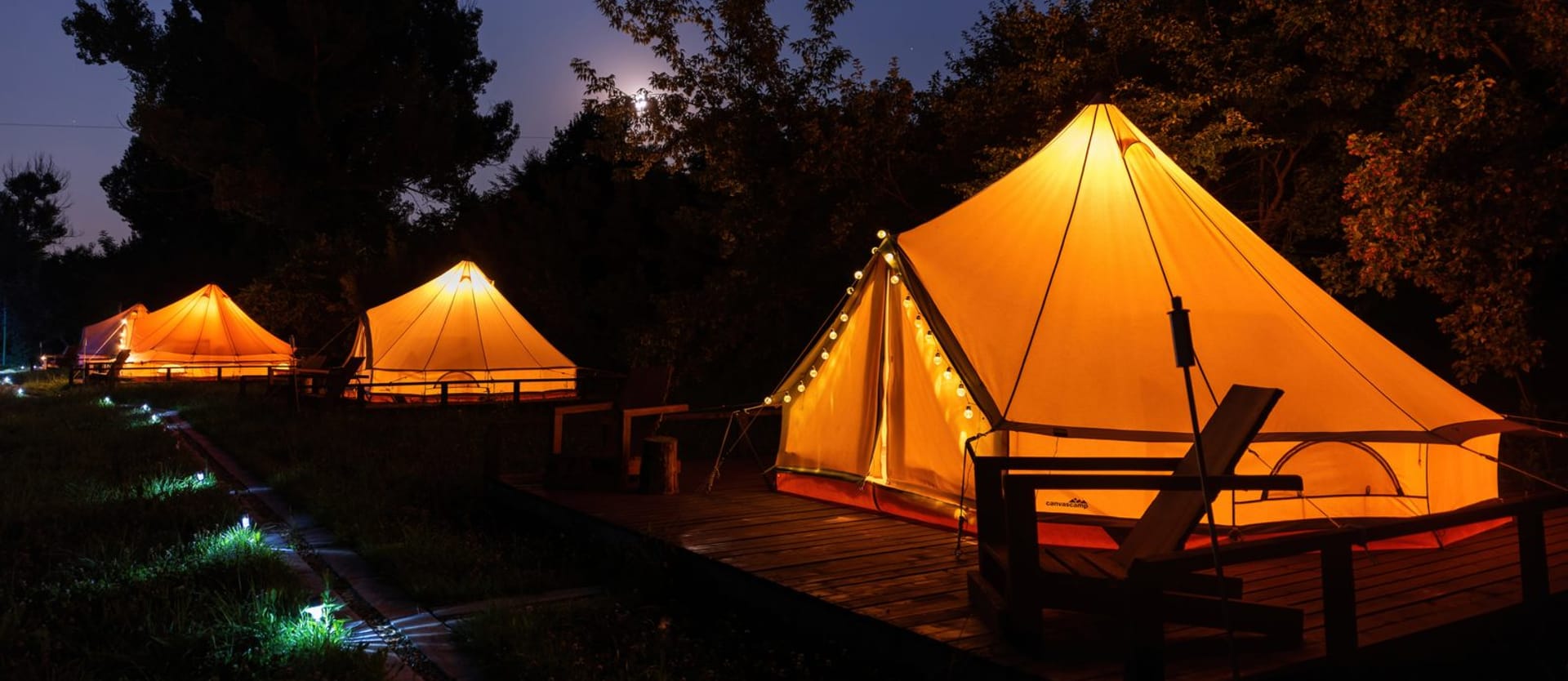Severely struck by the coronavirus pandemic, the travel industry is slowly but steadily reaching its full potential. Still, the industry doesn’t look the way it did before March 2020. COVID-19 changed the behavior, demands, and expectations of people planning their next journey. Shifts in travel patterns opened up new niches for startups, giving them a unique opportunity to harness the emerging trends and address important but so far unmet customer needs.
In this article, we’ll mention the budding tourism trends and give seven examples of startups that capitalize on the changes in the industry.
In 2022, Travel Edge Network published a study on bleisure travel that detected an increase in interest for workations (vacations with elements of work and leisure) and bleisure trips by over 25 percent compared to recent years. The duration of such trips has tripled within the last three years, exceeding ten days. Additionally, bleisure travelers now tend to bring their partners, families, and friends with them, requiring more spacious lodging options.
At the same time, many tourists still have problems finding eco-friendly accommodations. And 31 percent even don’t know about their existence. This stumbling point can be viewed as a growth opportunity. Companies can attract broader audiences by providing them with transparent information and making sustainable travel options easier to find.
In this article, we’ll mention the budding tourism trends and give seven examples of startups that capitalize on the changes in the industry.
Post-Covid travel trends: how people go on a trip after the pandemic
Most trends that are shaping the travel industry today existed before pandemics. Tourists then and now express a need for a high level of personalization, they want to easily book trips and make transactions online. However, a lot of significant shifts occurred in response to COVID-19 restrictions and regulations. Let’s look at some of them.Bleisure and workations mixed with family travel
According to Finances Online’s report on future business travel trends, one of the leading positions is held by bleisure — the trend when corporate trips accommodate leisure activities. On average, bleisure travelers take the opportunity to mix work with pleasure once in two or three months, with the trend being especially popular among millennials.In 2022, Travel Edge Network published a study on bleisure travel that detected an increase in interest for workations (vacations with elements of work and leisure) and bleisure trips by over 25 percent compared to recent years. The duration of such trips has tripled within the last three years, exceeding ten days. Additionally, bleisure travelers now tend to bring their partners, families, and friends with them, requiring more spacious lodging options.
Sustainable travel
According to the 2022 Sustainable Travel Report by Booking.com, 71 percent of people worldwide want to travel more sustainably next year and 38 percent already consider whether a property makes efforts to reduce impact on the environment.At the same time, many tourists still have problems finding eco-friendly accommodations. And 31 percent even don’t know about their existence. This stumbling point can be viewed as a growth opportunity. Companies can attract broader audiences by providing them with transparent information and making sustainable travel options easier to find.
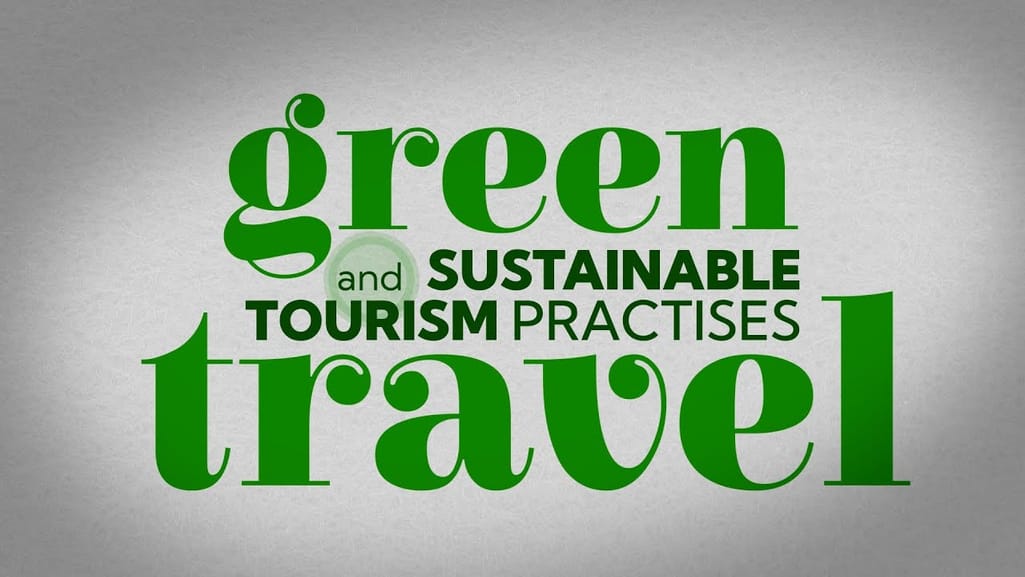

Learn more about green and sustainable travel in our video
Local experiences
Along with the need for sustainable options, tourists crave to connect with residents of their destination. Immersing in the life of local communities helps travelers have more meaningful journeys and discover the world.The above-above mentioned Booking.com research indicates that 66 percent of their respondents are willing to have authentic experience. Another study on local experiences travel published in August this year shows that almost two-thirds (63 percent, more precisely) of global travelers want the money they spend on trips to benefit local communities.
Addressing health concerns
The coronavirus pandemic divided the timeline of the travel industry into periods before and after, forcing travel companies to adapt to new health concerns. Even after governments lifted COVID-19 restrictions, many tourists continued to worry about possible health risks and limitations related to them.This resulted in increased demand for strict hygiene measures, contactless experience, easy access to medical and travel insurance, actual information on epidemic situations, and more. In March 2022, the statistics portal for market data Statista revealed a survey on travelers opinion on accomodations use of latest tech 2020. According to it, over 60 percent of respondents agreed technological advancements can make them feel safer when traveling.
Wellness travel
Another hot post-covid trend is wellness travel which allows people to start, support, or maintain a healthy lifestyle. According to the latest report by the Global Wellness Institute, wellness tourism shrank by 39 percent during the pandemic. Yet, now it shows the annual growth rate of 20.9 percent and will keep rising at the same speed up to 2025. This rate is significantly higher than the projected growth of the entire wellness economy (9,9 percent yearly) and its other sectors.
Average annual growth across different sectors of the wellness economy. Source: The Global Wellness Economy: Looking Behond COVID.
Digital nomads
Digital nomads are employees that can live in whatever part of the globe and work remotely full-time or part-time, combining work with traveling around the world.Before the coronavirus pandemic, there were approximately 65 million digital nomads worldwide. Now it is expected that in 2035 their quantity can rise up to one billion. Countries like Germany, France, Spain, and Portugal are already creating digital nomad visas that permit travelers who are already employed to work remotely abroad. This fact shows that governments are aware of digital nomads’ importance to modern economics and society.
Usually, travel startups accommodate several trends, not forgetting about undying demands for personalization and simple online booking. So, let’s look at some novelty businesses that are deservedly gaining recognition.
Travelin.ai: a platform enhancing bleisure travel
Trends covered: bleisure + green travel + safety concernsCustomers: business travelers, travel administrators, finance departments, HR departments
Financials: raised $510 thousand over one (pre-seed) round. Funded by 2 investors.
Travelin.Ai is the Norwegian next generation corporate travel management platform launched in 2020. Being part of Amadeus for Startups program, it combines bleisure and sustainable travel trends and caters to business travelers, travel administrators, HR, and finance departments.
The main goal of the startup is to save costs and reduce stress when planning a bleisure trip or workation. It enables employers to assign a personal travel budget to each worker as a bonus or a part of their compensational package. Both business and leisure types can be safely combined in one booking, as the platform automatically separates expenses. And the booking process, in turn, takes a minute on average, allowing users to quickly choose and buy travels from major airlines and hotels across 180 countries.
Travelin.Ai contributes to sustainability by helping their customers build the greenest route to their destination and offering a CO2 emissions visibility dashboard to easily track the carbon footprint of the trip. The platform also features safety scores that reflect a crime level, COVID-19 restrictions, and whether a particular hotel meets health and safety protocols.
Runway Health: a telehealth platform addressing most common travel diseases
Trends covered: health concerns during the tripCustomers: travelers, travel operators
Financials: raised $1,5 million over one (pre-seed) round. Funded by 1 investor.
Runway Health, launched in 2022, is a direct-to-consumer (D2C) travel telehealth platform accessible 24/7 from any location with Internet connection. The solution recommends medications, lets you select drugs from available options, and after that connects you with a US-licensed physician to validate your choice. If the doctor approves and prescribes the drug, Runaway will ship it to you within 3 to 5 days. The platform covers medications for the five most common travel ailments: malaria, diarrhea, motion sickness, sleeplessness, and altitude sickness.
Origin: a personal travel assistant for luxurious journey
Trends covered: personalization + sustainable travel + local experienceCustomers: frequent travelers, luxury travelers, bleisure travelers
Financials: raised $5 million over two (pre-seed and seed) rounds. Funded by 6 investors.
 That’s how a user sees the Origin application. Source: Pursuitist
That’s how a user sees the Origin application. Source: Pursuitist
After a customer submits basic information about a desired journey, travel curators apply their local experience and machine learning algorithms to craft a personalized itinerary which includes flights, accommodations, experiences, and more. Keep in mind that Origin prioritizes accommodation and destinations that have a strong connection to the local community. The platform also offsets the carbon emissions of its travelers for each trip.
The annual Origin membership costs $3,000. It covers an unlimited number of plans and 24/7 support during trips. But you may also pay per trip ($400) and revise the suggested itinerary as many times as necessary to get a perfect journey. The final service can be, for instance, a luxurious wine-tasting trip with a flight and table reservation in an exquisite restaurant.
Campspace: an outdoor version of Airbnb
Trends covered: outdoor travel + sustainable travel + local experienceCustomers: travelers, local hosts
Financials: raised $3 million over one (undisclosed) round. Funded by 3 investors.
Campspace is a Dutch overnight stays platform offering over 2,000 sustainable outdoor accommodations such as tents, campervans, yurts, cabins, and treehouses in more than 30 countries. Sometimes called “a green outdoor Airbnb”, it aims to provide tourists with a unique experience, address the negative impact of CO2 emissions, and support local tourism.
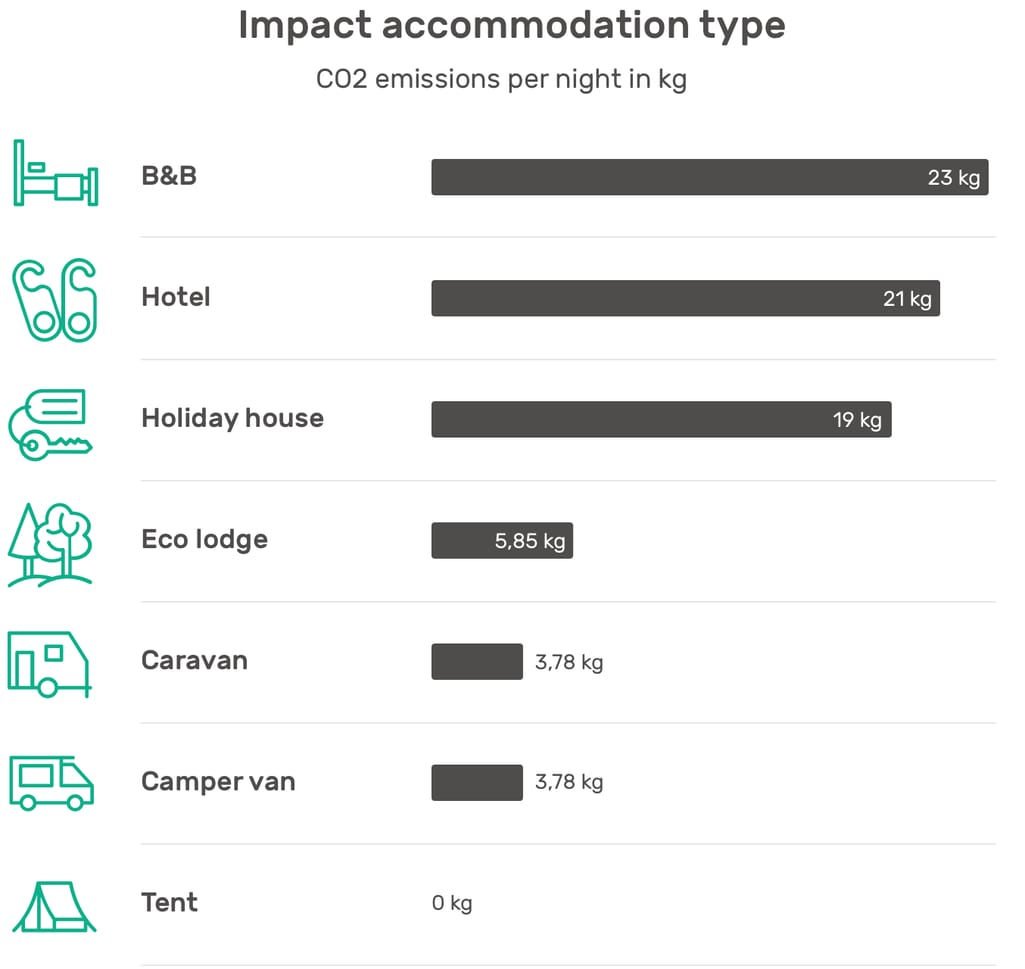
The camping platform helps tourists to become more sustainable. Source: Campspace
The platform serves both tourists and hosts who can welcome guests to their camp spaces (say, backyards) or accommodations via the website. No commissions or start-up fees are charged. Moreover, Campspace engages over 400 scouts who among other things take free pics of places to stay.SafetyWing: travel and medical insurance for digital nomads and remote teams
Trends covered: digital nomads + health and safety concernsCustomers: digital nomads, remote employees and their employers
Financials: raised $47.1 million over six rounds (the latest was the series B round). Funded by 12 investors.
Launched in 2017, Norwegian travel insurtech startup SafetyWing is currently having its times of prosperity. It provides travel and medical insurance for a growing army of digital nomads and remote workers who face the challenge of staying safe and secure when abroad.
SafetyWings offers two different packages. Nomad Insurance covers medical assistance in case of accidents or falling sick when abroad. It also includes compensation for unforeseen travel obstacles — like flight delays, lost luggage, or emergency evacuation. Customers pay a monthly fee for services (starting from $42) and can easily deactivate them when needed.
The second package, Remote Health, is a full-fledged health insurance plan working in 175 countries. The price starts at $206 per month, but will depend on a worker’s age and a number of add-ons. At present, the company also works on adding such products as Remote Retirement and Remote Doctor.
Nomad Stays: exclusive affordable stays with instant booking and payment
Trends covered: digital nomads + sustainable travelCustomers: digital nomads, remote workers, property owners
Financials: raised $200 thousand over one (pro-seed) round. Funded by 1 investor.
Nomad Stays is a travel platform for digital nomads and property owners founded in 2019 in the US. It enables instant booking of accommodations over 64 countries and 215 locations. All provided stays have stable 24/7 WiFi connection and nearby or on-site work spaces. While the platform is commission-free for hosts, nomads pay a booking fee to access deals.
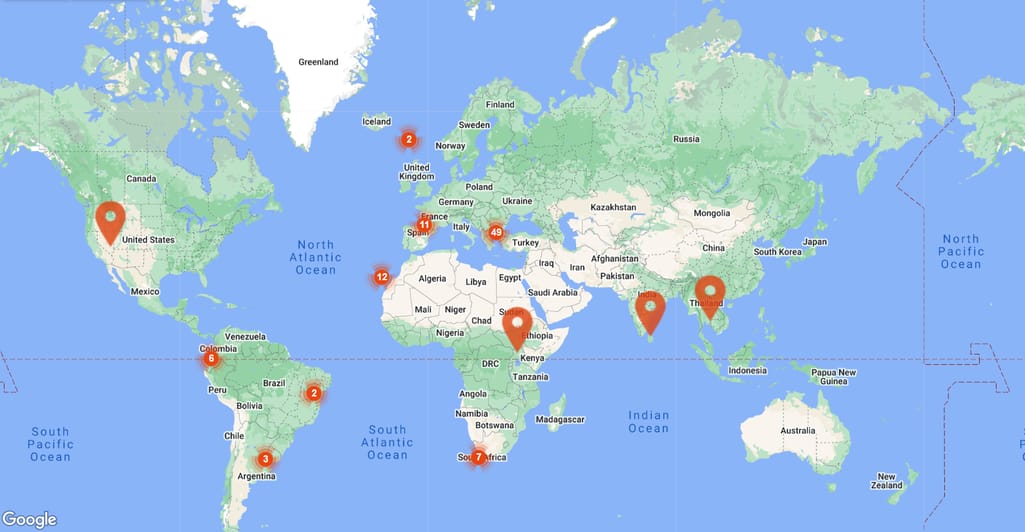
NomadStay map with options available for booking worldwide. Source: Locations Map
The platform offers customers to choose from a range of stay experiences — from farm stays to safari or beach life. Also, it provides pet-friendly options and properties convenient for motorbikers (with an area suitable for parking a bike.) While the startup welcomes different accommodations including apartments, boutique hotels, hostels, rental houses, and even campsites and castles, it doesn’t work with homestays and unofficial accommodation properties.Basubu: yoga and meditation retreat for travelers
Trends covered: wellness travel + local experiences + addressing health concernsCustomers: wellness travelers, retreat organizers
Financials: undisclosed
Launched in 2021, Basubu is a travel marketplace from England with the initial emphasis on meditation and yoga. Other options to relax and recharge include healing, fitness, detox, cooking, spiritual, and dance retreats. The founders believe health and wellness travel is a breath of fresh air for many travelers after the severe phase of the pandemic.
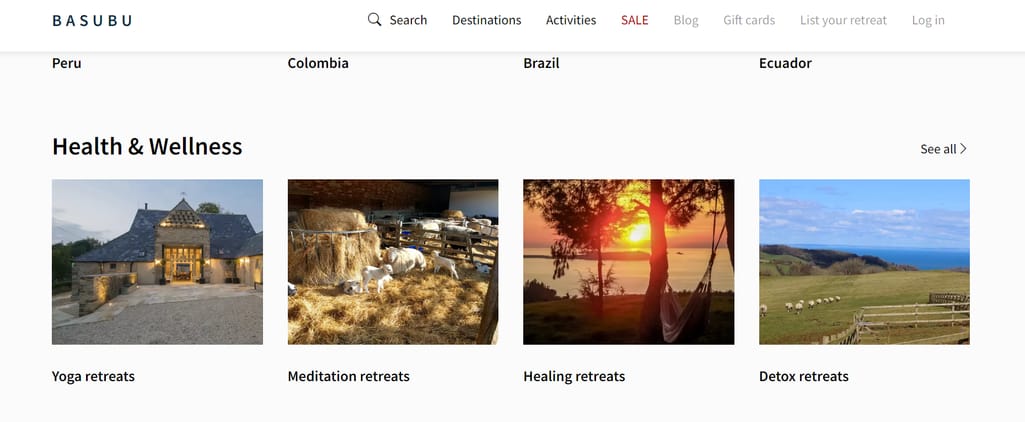
Wellness travel becomes closer with multiple retreat options provided by Basubu. Source: Basubu
The platform is two-sided: It helps both guests and retreat organizers seeking an opportunity to market their services globally. Basabu has an engaged host support team that navigates both users and their hosts 24/7. The startup charges commissions for bookings made via their platform, and that is how the company makes money.Future of travel: other emerging travel trends and opportunities to consider
All trends mentioned above are here to stay and see further growth and development. But besides that, we want to share some recent findings with those who consider investing into travel business.Booking revenue increases in vacation rentals. According to the Global Vacation Rental Report 2022, expected booking revenue over the post-pandemic year (2022) will exceed the pre-pandemic (2019) figures by 35 percent. While properties in all types of locations will reap extra earnings, rural areas and especially ski resorts are waiting for the biggest surge in the number of guests.

Expected revenue growth for vacation rentals by location type. Source: Global Vacation Rental Report 2022.
Travelers spend more on experiences than on things. MasterCards’s Travel 2022: Trends and Transitions study shows that in 2022, spendings of travelers on experiences have risen by 34 percent on average above 2019 levels. Tourists spend 72 percent more at bars and nightclubs, 35 percent more on recreation activities (amusement parks, museums, concerts, etc.), and 31 percent more at restaurants.There is a growing demand for inclusivity in travel. A recent Inclusive Travel Report by Expedia Group reveals that 92 percent of travelers think it’s important for providers to ensure the inclusiveness of their services. In other words, businesses should guarantee that their destination, lodgings, transportation options, or activities are accessible to all people, regardless of their physical or mental limitations and age. All in all, 7 out of 10 travelers would choose a trip option that is more inclusive, even if it’s more expensive.
The report also highlights that today, over one billion people (15 percent of the global population) live with a disability. Their total income amounts to trillion dollars, with 95 billion spent on travel alone annually.
Artificial intelligence will change the travel industry in the future. The State of Travel Startups Survey conducted by the travel industry news site Skift and global distribution system Amadeus uncovers that 26 percent of legacy stakeholders (like hotels and airlines) are open to innovations. Technologies that will presumably have the strongest impact on travel are artificial intelligence, predictive analytics, blockchain, the Internet of Things, and voice-based search.
